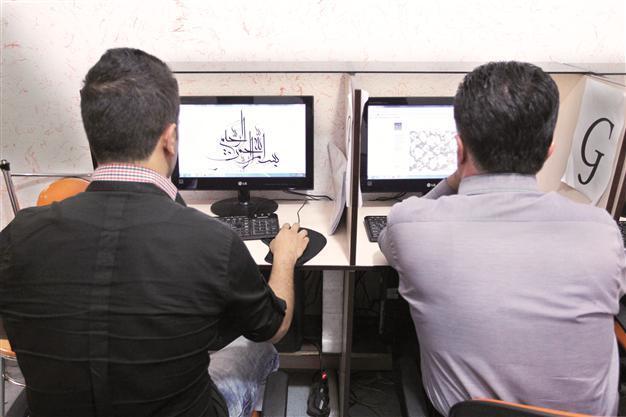Iran tightens control of Internet as key presidential election looms
TEHRAN - Agence France-Presse

Iranians use computers at a cybercafe Tehran. Iran is tightening control of the Internet ahead of next month’s presidential election,, users and experts say. AFP photo
Iran is tightening control of the Internet ahead of next month’s presidential election, mindful of violent street protests that social networkers inspired last time around over claims of fraud, users and experts say. The authorities deny such claims, but have not explained exactly why service has become slower.Businesses, banks and even state organizations are not spared by the widespread disruption in the Internet, local media say. “The Internet is in a coma,” said the Ghanoon daily in a report in early this month.
“It only happens in Iran: the election comes, the Internet goes,” it said, quoting a tweet in Farsi.
Facebook, Twitter, YouTube and numerous other sites, including thousands of Western ones, have been censored in Iran since massive street demonstrations that followed the re-election of President Mahmoud Ahmadinejad in 2009.
Those protests, stifled by a heavy-handed crackdown that led to numerous arrests and even deaths, were instigated online and observers say the authorities are choking the Internet to prevent a recurrence. One DVD vendor, who sells illegal copies of Western movies downloaded online, said “you can forget about downloading stuff; the bandwidth drops every other minute.”
‘Checking e-mails a pain’
A network supervisor at a major Internet service provider in Tehran said his company had been unable to address complaints about slower speeds, particularly accessing pages using the HTTPS secure communications protocol.
“Browsing (the net) is difficult due to the low speed. Even checking e-mails is a pain,” he said. “Sometimes, loading a secure Google page takes a few long seconds,” he added.
The problem is not limited to slower speeds, but also affects what people can actually access.
Earlier this month, an Iranian IT website reported that the last remaining software that enables users to bypass filters imposed on net traffic “has become practically inaccessible.”
Authorities refuse to officially confirm the new restraints, but former officials and media reports have accused the Supreme Council of Cyberspace of ordering them. The council, set up in March 2012, is tasked with guarding Iranians from “dangers” on the Internet while enabling “a maximum utilization of its opportunities.” The complaints come as Iran prepares to elect its new president on June 14, but the authorities reject claims that there is any link with that and the current problems. The disruptions are also linked to Iran’s stated plan of rolling out a national intranet that it says will be faster, more secure and clean of “inappropriate” content, observers say.
Critics say the unfinished “National Information Network” could expose Iranians to state monitoring once operational.
















